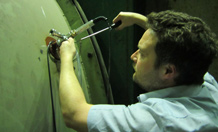
Tom Clifford from Camborne School of Mines working at the Valenje mine in Slovenia.
Energy and cost saving in mines achieved by innovative technique from Camborne School of Mines
A new approach that will save energy and reduce ventilation costs in mines has been developed by the University of Exeter’s Camborne School of Mines.
The pioneering new method uses sensors that monitor fan performance to ensure that the fans work close to the highest possible efficiency and hence lowest cost for the mine.
Underground mines are primarily ventilated by large fans at the surface that draw air through the complex system of tunnels and spaces. Good ventilation is of particular importance in coal mines, where combustible methane gas can accumulate and create a major safety hazard.
Camborne School of Mines researchers Tom Clifford and Nick Williams recently installed the sensors at the large Velenje Coal Mine in Slovenia to trial the system. The researchers worked alongside local mine technicians on the installation and to take the first measurements. The results will be used to prove the effectiveness of this innovative approach that will ultimately be available to help improve ventilation systems in other mines across the world.
Tom Clifford from Camborne School of Mines who is also a director of the Cornwall-based pump testing and monitoring company Riventa UK Ltd, said: “The opportunity to trial the system at the mine in Slovenia will be both useful for our Slovenian collaborators and will help in proving a system that has scope for much wider use. It is an example of how Cornwall looks outwards internationally to offer technological solutions to industrial challenges.”
The technique was developed as part of a nine-partner European research project, named LOWCARB, led by the Camborne School of Mines. The project aims to improve energy efficiency and to reduce carbon emissions at underground mines. The partners include coal mining companies, other universities and specialist mining research establishments. Other research highlights of the project include capturing and harnessing the energy from the potent greenhouse gas methane that accumulates in coal mines from the seam and surrounding strata; energy storage concepts; and improving the efficiency of handling the large electrical loads necessary for mining.
Building upon this work, Camborne School of Mines is also now involved in a new European project, called M-SMART GRID, which aims to develop new holistic thinking in electricity supply and demand management that will be refined for mine sites. The LOWCARB and M-SMART GRID mine energy projects have received funding from the European Community's Research Fund for Coal and Steel and this research has been brought to Cornwall by Dr Patrick Foster and Dr Gareth Kennedy from the Camborne School of Mines.
Dr Kennedy said: “The areas of better energy management and improved exploitation of energy resources, with concurrent reduction in greenhouse gas emissions, are among the key challenges that the research community needs to address; Camborne School of Mines is well placed to remain at the forefront of applying this to mining.”
Together with the continuing high employability of the young mining engineers and geologists that graduate each year and a wide range of other important minerals-related research, the future is looking energetic for the Camborne School of Mines in its 125th year of existence.
This research has received funding from the European Community's Research Fund for Coal and Steel (RFCS)grant agreement n° RFCR-CT-2010-00004.
Date: 17 July 2013
